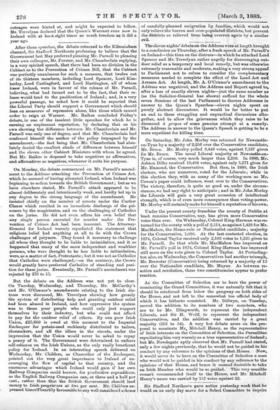After these speeches, the debate returned to the Kilmainham channel,
Sir Stafford Northcote professing to believe that the Government last May preferred pleasing Mr. Parnell to pleasing their own colleague, Mr. Forster, and Mr. Chamberlain replying, in a very spirited speech, that there had been no division in the Cabinet as to the Prevention of Crimes Bill, that the Cabinet was perfectly unanimous for such a measure, that twelve out of its thirteen members, including Lord Spencer, Lord Kim- berley, Lord Carlingford, and Lord Hartington, all of whom knew Ireland, were in favour of the release of Mr. Parnell, believing, what had turned out to be the fact, that their re- lease would tend to the pacification of Ireland ; and, in a very powerfal passage, he asked how it could be expected that the Liberal Party should support a Government which should lean on measures of repression alone, like those which caused order to reign at Warsaw. Mr. Raikes concluded Friday's debate, in one of the insolent little speeches for which . he is earning an unpleasant reputation, by declaring that on his own showing the difference between Mr. Chamberlain and Mr. Parnell was only one of degree, and that Mr. Chamberlain had confessed himself the author of the policy impugned by the amendment,—the fact being that Mr. Chamberlain had abso- lutely denied the smallest shade of difference between himself and the eleven other Cabinet Ministers with whom he agreed. But Mr. Races is disposed to take negatives as affirmatives, and affirmatives as negatives, whenever it suits his purpose.


































 Previous page
Previous page